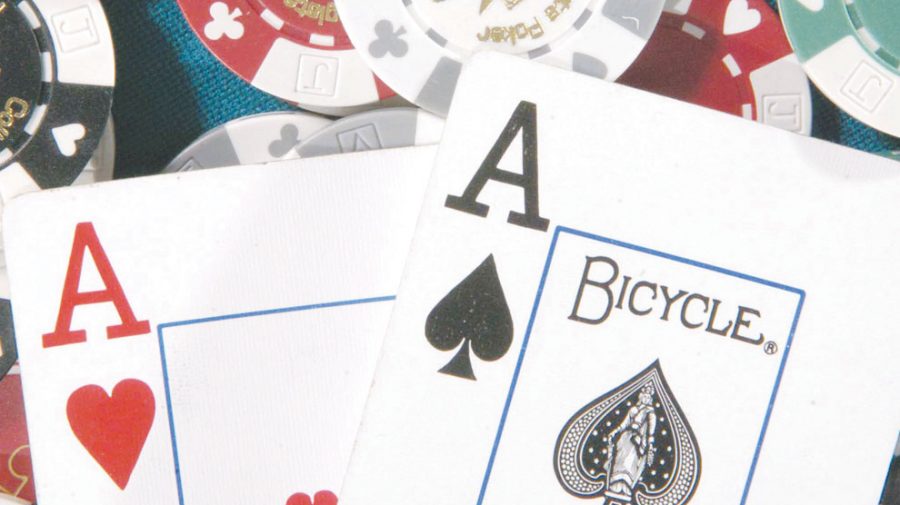College students gamble for many reasons. Number one – it’s fun, Marc Moncayo, a sophomore majoring in education, said.
According to statistics provided from Barbara Bucca, owner of the Your Poker Club website, 91 percent of the male and 85 percent of the female college population gambles.
Kenneth Melvin, a UA professor who teaches a course that deals with risk-taking and sensation seeking, said there are two motivations for gambling: the desire to win money, and thrills and excitement.
“If there were no betting,” Melvin said, “very few people would go to the track to watch dogs run in a circle. Other motivations, and these may vary with the type of game, are a need for mastery, escape from routine, intellectual challenges and social interactions.”
Chandler Bator, a student at Arizona State University, has created a 100 percent legal online poker site, “designed for college students, by college students.”
Your College Poker Club will allow students to play and win, but eliminates gambling and losing money, a press release stated.
“Once a student starts playing [in other online poker websites],” Bator said, “they can become enrapt in the enticements of the off-shore illegal Internet gambling sites whose philosophies are all the same. When a player wins, a player will continue to play. When a player loses, they will pay even more.”
A version of the site, BamaPokerClub.com, will be available by the end of the month, Bucca said.
“We will have announcements in various locations, viral and physical,” Bucca said. “Students will see posts on all the favorite Facebook pages frequented by University of Alabama students. We also have hired campus marketers, who will be posting flyers on and around campus with information as to how to join.”
The site will offer a 14-day Free Trial period during which students can play in two free tournaments with the opportunity to win a seat at the 2011 World Series of Poker in Las Vegas.
Bucca said the site will be fun, exciting and totally risk-free.
“We are working at eliminating the evils of gambling by our youth,” Bucca said. “When you cannot wager or bet real money, it’s not gambling. Poker is just a game and does not become a gambling venue until legal tender is wagered or bet.”
Bucca said eliminating gambling and money will not make any difference in the way the game is played.
“Students can and will still have the ability to win money on our website, as we give out over $100,000 per month,” Bucca said. “The big difference is members cannot use any of their personal legal tender to play on our site. They will be playing with our YCPC bucks; like Monopoly money, it has no value.”
Moncayo said taking these elements away from the game makes it completely pointless.
“Half of poker is knowing that you could lose at any time and you won’t be able to play anymore because you’re not going to have any money afterwards,” Moncayo said. “So, what would be the point of playing if you have no regard to the money you have? If it’s not for money, it’s not worth it. It’s not going to create an actual game. Everybody would go all-in knowing that it’s ‘fake’ money. Nobody is going to care.”
Caleb Hughes, a fifth-year senior majoring in psychology, said the site has the potential to be successful if students find it engaging enough.
Hughes said he has played online poker before on sites like PokerStars.net and PokerRoom.com, but after losing $50, he hasn’t played for money any more.
Hughes compared gambling to playing golf.
“[Golf] is a really hard game to play,” Hughes said. “But if you make one really good shot, you kind of want to keep going back and do it again no matter how bad your round was. With poker, you may start with $50 and you get up to $75 and then you lose it all. You think, ‘well, you know, I just need to go back to what I was doing when I had that $75. You had your one shot and it feels good because money is something that has great value. When someone does have a good hit on a gamble, they think, ‘Hey, maybe I have some skill at this.’”
Hughes said because the site does not allow students to wager legal tender, it’s a lot like playing poker for fun with plastic chips when you were younger but doesn’t compare to playing for real money.
“I guess it was kind of fun then,” Hughes said. “The first time you start playing for something and you go back to playing for nothing, it’s not the same. You’re really careless, you don’t care what the outcome is if you lose. You’re just like, ‘Okay, no big deal.’”
Jared Boyer, a senior majoring in mechanical engineering, said he is not much of a gambler.
“The closest thing I’ve done to gambling is playing poker with my friends,” Boyer said. “I’ve never got into the online stuff. I’ve seen some win, some lose; so I stay away from it. I’ve seen how addicting it can be.”
Bator said if you take the money away from the game, it takes away from the whole competitive strategy.
“It takes the gamesmanship out of poker,” he said. “Which is why I don’t really get into it, because you almost have to have money to make it poker.”










